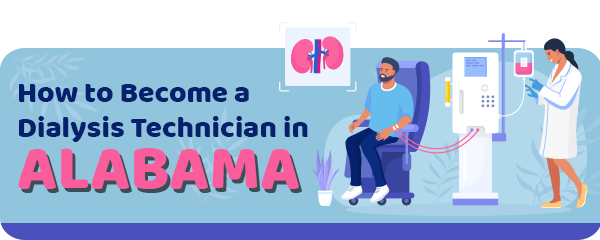Many people would die faster if it weren’t for dialysis machines and the technicians operating them.
In this context, dialysis technicians play a vital part in the medical industry.
These technicians may not have the most glamorous job in the field, but for those who want to help others, it’s a rewarding one.
You came to the right place if you want to become a dialysis technician and learn more about this occupation.
Article Table of Contents
Dialysis Technician Job Description in Alabama
It’s important to know what kind of job these professionals perform.
These techs work with patients whose kidneys don’t function properly.
However, their focus is on ensuring their equipment is in good working condition as well as operating it.
Other key responsibilities of these professionals are:
- Monitor the vital signs of the patients
- Assisting the patients during the procedure
- Ensuring patients are safe and comfortable
- Reviewing their medical history
- To make sure there are no other conditions that need to be taken care of during the procedure
- Adjusting the dialysis machines depending on the needs of the patients
- Administering oxygen – if needed
- Basic Cardiopulmonary Resuscitation – if needed
While there might be other job duties these techs must perform, the ones above are the most important ones.
Dialysis Technician Requirements in Alabama
In Alabama, these professionals don’t have many guidelines to follow.
It is up to the individual and/or the employer to seek appropriate training before starting work.
Most dialysis employers will follow the regulations set forth by the federal Centers for Medicare and Medicaid Services (CMS).
According to the CMS, future dialysis techs need:
- High school diploma or GED
- Training
- Credentialing
- Competency
- Standards of practice
- Certification
- Licensure or certification
The certification has to be obtained in less than 18 months after starting working.
Here are some of the tests individuals can sit for if they want to obtain a nationally-recognized credential:
- The Nephrology Nursing Certification Commission (NNCC)
- Certified Clinical Hemodialysis Technician (CCHT) Exam
- The Board of Nephrology Examiners Nursing and Technology (BONENT)
- Certified Hemodialysis Technician (CHT) Exam
- The National Nephrology Certification Organization, Inc. (NNCO)
- Certified in Clinical Nephrology Technology (CCNT) Exam
- Certified in Biomedical Nephrology Technology (CBNT) Exam
The few guidelines available in Alabama for this occupation come from the Alabama Department of Public Health.
Let’s see some potential training schools for dialysis technicians!
Dialysis Technician Training Schools in Alabama
All dialysis technicians in Alabama must complete an appropriate training program before getting employed.
First of all, they must graduate from high school or obtain a GED.
While in high school, they should excel in these subjects:
- Biology
- Chemistry
- Anatomy
- Physiology
- Medical terminology
Their real training starts with vocational schools, community colleges, or technical institutes.
Their new curriculum will focus on:
- Principles of dialysis
- Care of patients with kidney failure
- Possible complications of dialysis
- Water treatment and dialysate preparation
- Infection control
- Safety
- Dialyzer reprocessing
These programs take at least a year to complete.
Let’s have a look at some post-secondary institutions!
Calhoun Community College 
This college offers a 50-hour long training program.
There are 2 ways of completing the program:
- Online
- In a classroom
The tuition for the online option is $1,299 and the ebooks are included.
This program has to be finished in 6 months.
The classroom option costs $999 and this fee also includes the textbooks.
These classes are held on Mondays and Wednesdays, starting at 6 p.m.
Refunds are done only for the in-person classes.
Auburn University 
Auburn University has a dialysis technician program that is offered fully online.
The $3,000 tuition covers:
- Interactive learning modules
- Learning exercises
- Career resources
- Lab
- 24/7 mentoring
- National and state certification opportunities
- Self-paced learning
It is expected of students to complete their classes in up to 6 months.
ASU offers an online training program for Certified Hemodialysis Technicians (CHT) exam offered by the Board of Nephrology Examiners Nursing and Technology (BONENT).
This means the program can easily be attended by students from other states, but they need to ensure it meets their state’s regulations.
The full tuition for this program is $4,190 which can be paid in installments.
The program has 205 hours that have to be completed in 12 months, even when learning at your own pace.
CPR training and certification is included in the course and it is offered by the Red Cross.
Some classes include:
- The Cardiovascular System
- The Urinary System
- The Endocrine System
- The Reproductive System
- Infection Control
- Principles of Hemodialysis
| School Name | Address |
|---|---|
| Alabama State University | Division of Continuing Education 32 Commerce Street Montgomery, AL 36104 US |
| Auburn University | Auburn, AL 36849 |
| Calhoun Community College | 102 Wynn Dr NW Huntsville, AL, 35805 |
Dialysis Technician Salary in Alabama
Nobody should choose this or that career without knowing how much they’ll earn.
In Alabama, dialysis techs earn on average, a bit over $40,000 per year.
Below, you can see the cities where the median income is a bit higher than that at the state level.
Annual Salary Range:| Location | Avg. Annual Salary |
|---|---|
| Paint Rock | $42,000 |
| Mooresville | $41,900 |
| Alabaster | $41,300 |
| Woodland | $41,300 |
| Bremen | $41,200 |
| Quinton | $41,200 |
| Sycamore | $41,200 |
| Wilton | $41,100 |
| Ralph | $41,100 |
| Abernant | $41,000 |
Regional Salary in Alabama
| Region | Employed | Avg. Annual Salary | Avg. Hourly Pay | Top 10% Annual Salary | Bottom 10% Annual Salary |
|---|---|---|---|---|---|
| Anniston-Oxford-Jacksonville, AL | 190 | $41,100 | $19.76 | $66,420 | $26,120 |
| Auburn-Opelika, AL | 110 | $50,760 | $24.4 | $80,230 | $30,380 |
| Birmingham-Hoover, AL | 2,270 | $52,960 | $25.46 | $78,480 | $32,320 |
| Daphne-Fairhope-Foley, AL | 130 | $44,870 | $21.57 | $67,090 | $29,520 |
| Decatur, AL | 90 | $47,870 | $23.01 | $67,990 | $32,860 |
| Dothan, AL | 220 | $47,510 | $22.84 | $65,400 | $27,770 |
| Florence-Muscle Shoals, AL | 120 | $44,010 | $21.16 | $64,700 | $27,870 |
| Gadsden, AL | 110 | $42,990 | $20.67 | $62,220 | $27,110 |
| Huntsville, AL | 550 | $47,980 | $23.07 | $76,970 | $29,650 |
| Mobile, AL | 530 | $49,190 | $23.65 | $74,460 | $29,060 |
| Montgomery, AL | 510 | $53,630 | $25.79 | $78,310 | $31,890 |
| Tuscaloosa, AL | 240 | $51,510 | $24.76 | $77,020 | $30,630 |
* Employment conditions in your area may vary.
Frequently Asked Questions
Which Other Skills Are Required for a Dialysis Technician in Alabama?
Dialysis techs must possess a series of skills and abilities.
These include:
- Attention to details
- Excellent communication
- Empathy
- Patience
- Compassion
- Technical mind
Where Does a Dialysis Technician in Alabama Find Work?
There are many different settings where a dialysis technician can find employment.
These next locations are the most common:
- Hospitals
- Dialysis centers
- Outpatient clinics
- Home healthcare agencies
Do I need a license or a certification to work as a dialysis technician in Alabama?
In Alabama, individuals don’t need a license, but a certification recognized at the national level.
Read the full guide: How to Become a Dialysis Technician


